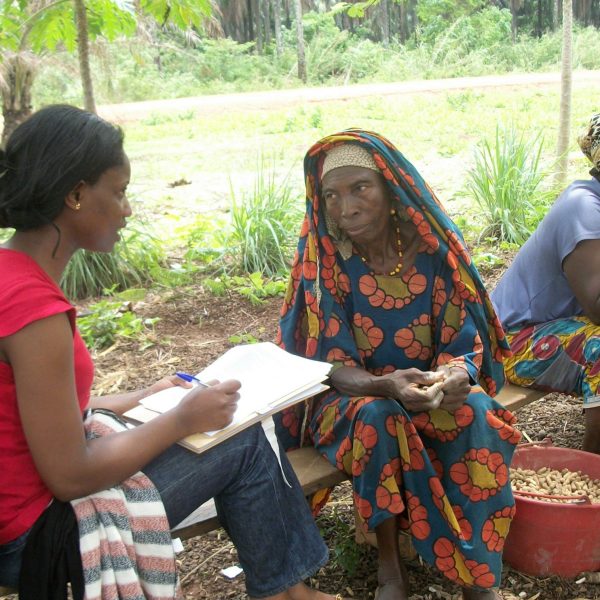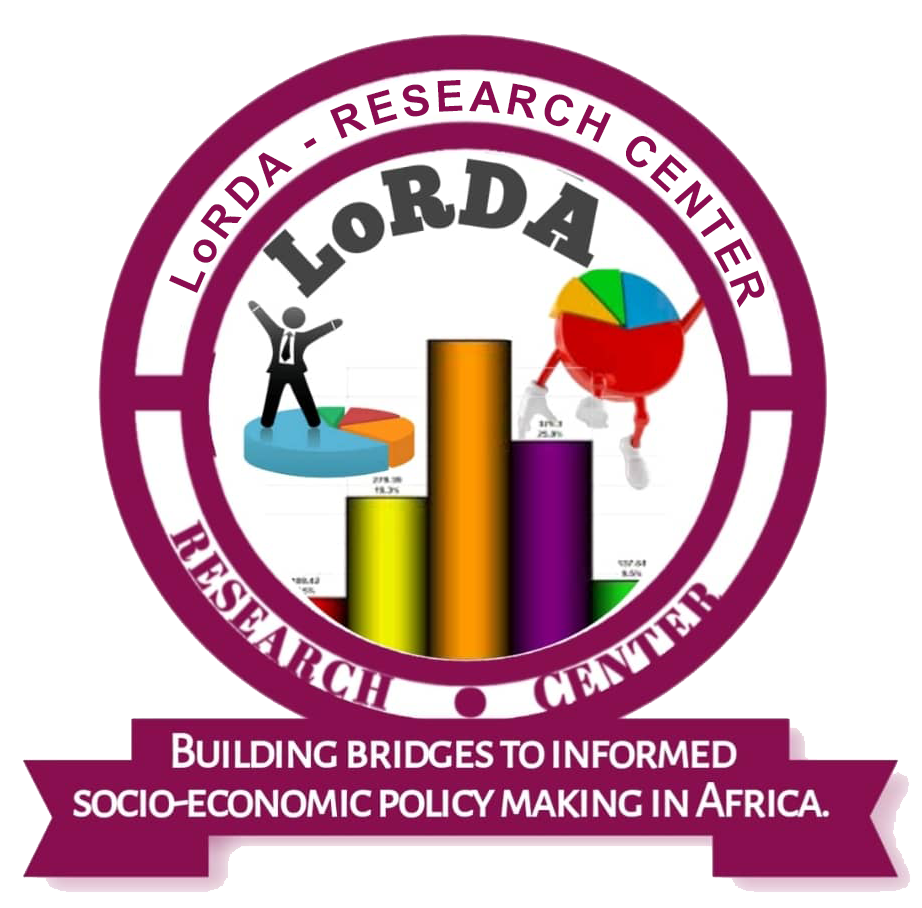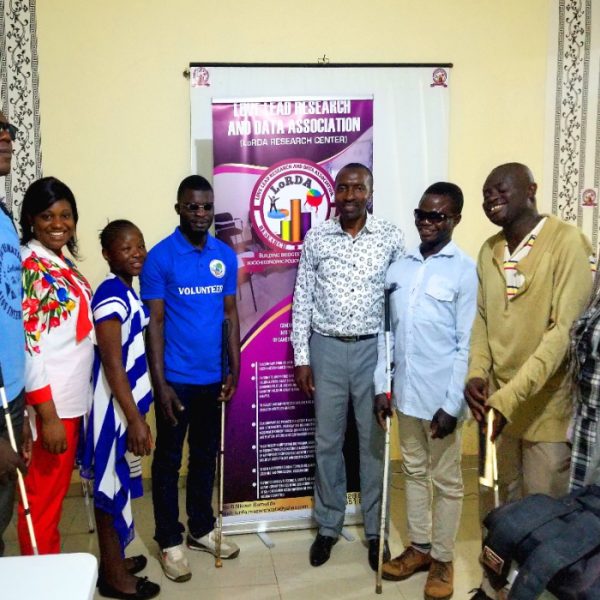Building bridges to informed socio economic policy making in Africa.
Project on the adaptive I.T. training for students with visual impairment.
Students with visual impairment (VIs) who have attained a level in their education that requires the research of study materials and project/dissertation/thesis writing are faced with many tough challenges. A very tiny and negligible portion of the needed study and research materials (such as literature and theories) are available in braille. They cannot read materials in print and a large proportion of them do not have the requisite computer knowledge adapted to access and read study and research materials. These stubborn challenges are posting as exclusionary factors; excluding students with VI from higher education that requires a lot of research. Some of them who have braved these challenges to push through with research work have done so with the help of friends and family members, who help to read aloud print and soft research materials, type and arrange the research ideas. This could constitute a demerit to their independent mindedness in research writing.
Bafou stella, a student with VI, typing in MS Word for her first time
Mbiydzenyuy Louisa, a student with VI, using the computer for her first time.
Mbuh Silas, a student with VI, mastering the PC computer
Zama Walters, a student with VI, being drilled on how to use google and e-mailing internet services.
This adaptive I.T. training for VIs was aimed to reverse all these challenges and enable the VIs do many of the research related tasks by themselves. The project was funded by Planted Streams, Athletico Sport Club (a community sport group) and Dr Nkam Michael, and had as focus to train VIs in Tubah Sub-Division, Northwest Region, Cameroon. It ran from the 17th February – 17th April 2022, and we had eight (8) students with visual impairment who participated.
The project had the following specific learning outcomes:
- Enable the VIs work with NVDA (Non-Visual Desktop Assistance); that assists them in navigating the computer and opening programs,
- Provide them a mastery of the computer keyboard,
- Enable them to type using MS Word, save and retrieve a saved document,
- Train them to be able to navigate the desktop to open programs, use my documents to save and open files/documents,
- Familiarize them with the computer shortcuts to copy, paste, bold, align text and use other important keyboard shortcuts like (find, go to commands etc.),
- Train them to be able to perform grammar and spelling check after typing text in MS Word,
- Train them to be able to convert PDF documents to MS Word documents for easy navigation and reading,
- Train them to be able to create new folders to save documents/files,
- Empower them with knowledge to use the internet to search, download and save needed study and research materials, and
- Enable them to use e-mailing services; writing, reading e-mails and replying to e-mails.
The students with VI were so eager and zealous to learn. The project ended successfully and all the funders were very satisfied with the training outcomes in terms of the I.T. knowledge gained by the student with VI.
One of the major setbacks was the limited number of available computer laptops. LoRDA made three (3) laptop computers available for the training, but given the number of VIs and the need for each of them to follow the training and practice individually, myself and some LoRDA volunteers had to avail our personal computers in every training session.
Expectations: let us not stop at Tubah Sub-Division in the Northwest Region, Cameroon has students with visual impairment undergoing higher education and requiring such training. In each of the ten (10) Regions of the country, we have such VIs. Our team of experts and focal points for VIs are ready and willing to go to other Divisions in the Norhwest Region and even beyond the region to other regions in the country. Together, we can do this!
Consulting services to the Clinical Characterisation Protocol (CPP) of COVID-19 - Data Analysis Consultant, 2021.
As a data analysis consultant, the CEO of LoRDA and his team conducted data treatment (that is, the variable name, type, labels were defined and the values of the different options for categorical variables defined as well), produced a data analysis plan that served as a roadmap for how the collected healthcare worker survey data was organized and analysed in order to meet the survey objectives, and employed appropriate statistical software (such as Excel, SPSS, STATA, etc), to conduct data analysis activities. LoRDA team inputs and expert knowledge in data analyses were approvingly appreciated.
Consultant services to the consulting group CPAC (Douala, Cameroon) and INFRASTRUKTUR & UMWELT, Professor Bohn and Partner (Darmstadt, Germany) – Economic Expert, from 2018 to 2020
The CEO of LoRDA, as an Economic Expert, worked with a team of LoRDA Researchers in the drafting and implementation of the Northwest Regional Territorial Planning and Sustainable Development Plan. The client of the project was the Government of Cameroon, represented by the Ministry of Economy, Planning and Regional Development (MINEPAT). The CEO of LoRDA actively participated in refining the methodological tool proposed by the consulting group (CPAC and INFRASTRUKTUR & UMWELT) and drafted the chapter on the economy of the Northwest region. Specifically, him and the LoRDA team performed an inventory of the economy of the region; provided an analysis of the potentials, weaknesses, challenges and threats for the economic sector; formulated key stakes and issues and laid a commendable foundation for a prospective analysis of the region. The diagnostic report for the Northwest Region was highly appreciated by MINEPAT.
Consultant services to AFROBAROMETER/CERMGHE in 2015 and 2018
Hire, train (alongside AFROBAROMETER Experts), and supervise fieldworkers in the North West and South West Regions of Cameroon to collect data on Social, Economic and Political issues using CAPI. As a Senior Field Supervisor, Dr Ndamsa Dickson (CEO of LoRDA), had as mandate to ensure strict respect of the data collection methods of AFROBAROMETER, data quality at the regional level, effective team management in the field, and quality work in the regional team. Dr Ndamsa Dickson led the LoRDA Team of field workers to many villages and towns in the Northwest and Southwest Regions. AFROBAROMETER 2015 employed the PAPI approach to gather field data.

LoRDA fieldworker administering a questionnaire for AFROBAROMETER 2015
With AFROBAROMETER 2018. The students with VI were so eager and zealous to learn. The project ended successfully and all the funders were very satisfied with the training outcomes in terms of the I.T. knowledge gained by the student with VI.
One of the major setbacks was the limited number of available computer laptops. LoRDA made three (3) laptop computers available for the training, but given the number of VIs and the need for each of them to follow the training and practice individually, myself and some LoRDA volunteers had to avail our personal computers in every training session.
Expectations: let us not stop at Tubah Sub-Division in the Northwest Region, Cameroon has students with visual impairment undergoing higher education and requiring such training. In each of the ten (10) Regions of the country, we have such VIs. Our team of experts and focal points for VIs are ready and willing to go to other Divisions in the Norhwest Region and even beyond the region to other regions in the country. Together, we can do this!

